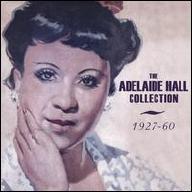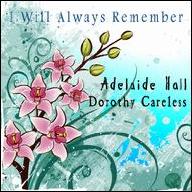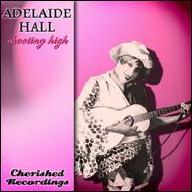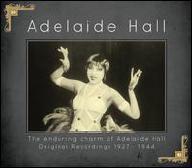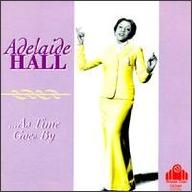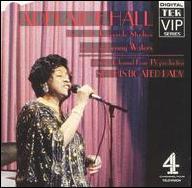Adelaide Hall was born in Brooklyn, New York, sometime between 1895 and 1909 (many biographers presume that the year 1901 is most likely correct), the older of two daughters of William Hall and Elizabeth Gerard. William taught piano at the Pratt Institute, and he started both daughters in music at an early age. Adelaide gravitated toward singing rather than the piano, however, and with her sister Evelyn formed a piano-vocal duet, performing at church and school events. The family was devastated by Evelyn's death during the influenza epidemic of 1918 -- by then her father had also passed away and Hall turned her attention to supporting herself and her mother. Her first break came on Broadway in 1921 when she was selected for the chorus of the revue Shuffle Along. In 1923, she was in the cast of the show Runnin' Wild, and the following year she married a merchant seaman from Trinidad named Bert Hicks.
During late 1927, Hall found herself booked on the RKO-Keith's theater circuit for a series of shows on the same bill with Duke Ellington. It was during this engagement that she discovered a brand new Ellington tune called "Creole Love Call," which became a celebrated collaboration between the two musical legends -- they recorded it together, along with a handful of other tracks, in late October of 1927 on Victor, and "Creole Love Call" became a major Ellington hit -- his first -- and Hall's signature tune for decades.
A year later, Hall stepped into the shoes of leading lady Florence Mills, who had died suddenly, in the Blackbirds of 1928 revue on Broadway and introduced the song "I Can't Give You Anything But Love." She seemed unstoppable as the songs and the hits kept coming her way. A two-week engagement at the London Palladium (which was later extended elsewhere for the visit) in 1931 led to the beginning of a contractual relationship with the English Decca label, which resulted in the recording of eight new songs and numerous records in the next dozen years.
Back in the U.S., Hall was on tour when she encountered a young pianist named Art Tatum, who was recommended as a replacement by her own accompanist, Joe Turner, when he decided to move on. The two performed together for a short time, and managed to record as well.
Hall's career might've continued in the United States, but for a series of ugly incidents that ensued when, taking advantage of her success, she, her husband, and her mother moved to a home she'd bought in Larchmont, New York. The upscale white community was unprepared to have a Black family in its midst and did its best to force them out legally -- when that failed, their house was then set afire, and while it was saved, Hall was unwilling to risk her mother's safety. She brought her back to New York City, but nothing was ever quite the same again.
In the mid-'30s, they moved to Paris, where she became an overnight sensation as a singer. The City of Lights made her a star during its last great postwar flowering, when the likes of Django Reinhardt and Stéphane Grappelli were just starting to build their legendary joint careers, Chevalier was in his prime, and Josephine Baker was the toast of the city. Hall and her husband even opened their own club, which was a success.
In 1938, she ran into difficulty when a young man claiming to be a member of European nobility approached her and threatened to kill her and himself if she didn't agree to a romantic assignation. Rather than wait to find out whether any part of what he said -- even the royal title -- was real, she and her husband lit out for London, accepting an offer from the legendary English theater producer Charles B. Cochran. Cochran, best remembered today for Rodgers Hart's Ever Green (the basis for the celebrated film Evergreen), had a knack for recognizing expatriate American talent, and had already given Black American choreographer Buddy Bradley a new start and a new, rich career in England. Cochran persuaded Hall to come to London to star in a show called The Sun Never Sets. Hall and her husband never looked back -- they moved to London, where they made their home permanently. In less than a year, she and her husband had a club of their own in the city and were entertaining guests such as Fats Waller (an old friend of Hall's from New York), with whom she also recorded.
Hall also appeared in movies (Black performers did make movies in America, but they were usually limited to small specialty appearances in major films or starring roles in low-budget pictures aimed specifically at Black audiences). In England, the roles were more exotic. For Hall, screen immortality came on the cusp of World War II, when she was cast in 1939 as the nurse to the princess played by June Duprez in Alexander Korda's The Thief of Bagdad (1940); Hall had no dialogue in the Technicolor fantasy classic, starring Sabu and Conrad Veidt, but she had the chance to show her skills with operatic-style singing in a poignant performance of a lullaby written by Miklós Rozsa, sung in a garden while the princess and her ladies in waiting listened languidly.
The war turned millions of British lives around, including Hall's. Her club was destroyed by a direct hit during a German air raid, but fortunately, Hall had cleared the building earlier in the evening, somehow anticipating an impending tragedy. As the war went on, she prepared personal welcomes for the American soldiers who were coming over in ever-increasing numbers, opening her own house on a regular basis, and she later joined the uniformed entertainment corps. Commissioned and dispatched to perform for the troops, she gained a new popularity among the troops with her performances in combat zones that hadn't been in Allied hands long. She was performing in Germany before the nation had entirely been secured by the Allies.
After World War II, Hall returned to England and continued to perform and record. She also turned to some theatrical work, appearing in a West End production of Cole Porter's Kiss Me, Kate -- in 1957, she returned to the U.S. to work in the Broadway production of Jamaica, starring Lena Horne. Her husband's declining health took Hall out of performing, and it was years after his death in 1963 before she resumed working in public. By that time, she was doing straight acting roles with Helen Hayes, as well as readings of poetry and music alongside Peter O'Toole and Dame Sybil Thorndyke. She performed in cabaret in the '70s, and cut new versions of her old classics with accompaniment by Humphrey Lyttelton; she also recorded a tribute album in memory of Duke Ellington.
Ironically, during the '80s, Hall was in almost as much demand as she'd been in the '30s, as a result of the release of the movie The Cotton Club. The film raised interest in the actual history of the celebrated performing venue in Harlem, and Hall was among the very few survivors from the ranks of those who'd performed there and found herself in constant demand for interviews and performances. By that time, however, she was in her eighties and her health was failing. Hall passed away in late 1993 after a short illness. Adelaide Hall was a very influential stylist as a performer from the '20s into the mid-'40s. Her early work, in particular, easily crossed over from to pop without offending either camp's sensibilities, and she introduced more than her share of pop and jazz hits and standards. ~ Bruce Eder, Rovi


